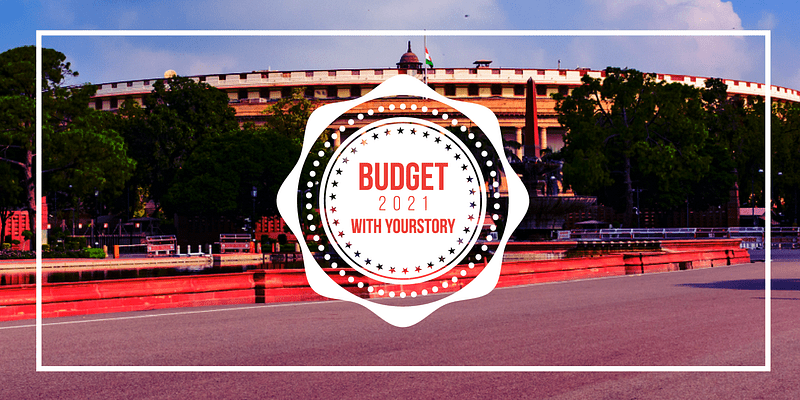2020 had been a year full of challenges for livelihoods and the overall economy of the country, sparked by the COVID-19 pandemic. According to the National Statistical Office (NSO), India's GDP is estimated to contract by a record 7.7 percent during 2020-21 fiscal as the pandemic severely hit key manufacturing and services segments.
The Union Ministry of Finance is all set to roll out additional measures to revive the slowing economy, post the Rs 20 lakh crore COVID-19 relief package announced in May 2020.
The upcoming Budget is also expected to boost domestic manufacturing across sectors, in line with the Indian government’s focus for a self-reliant economy.
This year, for the first time in the history of independent India, the Union Budget will be paperless. It is expected that the Budget papers, including the Union Budget and Economic Survey, will not be printed, and the government will provide soft copies for these documents.
With just a couple of weeks to go, every sector, including the Indian startup ecosystem — the third-largest startup ecosystem of the world — is eagerly waiting for the annual budget, to be presented by Finance Minister Nirmala Sitharaman on February 1.
Here's a look at what Indian business leaders, entrepreneurs, investors, and other stakeholders across the Indian startup ecosystem expect from the Union Budget.

Image Credits:YS Design Team
More focus on ease of doing business - Deepak Gupta, Founding Partner, WEH Ventures
One area which has implications for growth and job creation is the ease of doing business ("EODB"). Within that, India lags substantially relative to most in the area of enforcement of contracts. There are many elements to resolving this issue — from accelerated recruitment of judges to the improvement of arbitration processes, and others. We hope that action can be taken on this front in short order with specific pronouncements in the budget and follow-up from thereon.
Efforts to improve rural healthcare - Meena Ganesh, MD and CEO, Portea Medical
Despite 75 percent of the Indian population residing in rural areas, the healthcare concentration is heavily skewed in the urban areas. The best and fastest way to ensure quality healthcare access in rural India is through e-health/e-medicine services.
Funds must be allocated towards skill development of teachers, nurses, paramedical staff, and caregivers. Further, by making budget allocations for the development of telemedicine and home-based healthcare ecosystem in the country, it is possible to best harness the available resources to cover the whole country. This can be done through a public-private partnership more speedily and effectively.
Regulation of hygiene industry - Vikas Bagaria, Founder, Pee Safe
This year’s Budget gives us hope of better regulation of the hygiene industry, which will help in attracting more foreign investment. We believe that an increase in healthcare expenditure is crucial at this juncture, and India, currently, has the lowest public health expenditure in terms of GDP percentage. The country needs an equal, easy, and affordable access to quality healthcare.
As far as taxes are concerned, the provisions drafted must require no major changes for at least three years. This would reduce the compliance burden on startups and make management easier. Wherever needed, corrective changes need to be made to make implementation easier.
Facilitating better infrastructure for mental health startups - Shumita Kakkar, Founder, United We Care
There is a need to integrate technology-driven startups in its action plan to boost the physical, financial, and mental health of the public.
- Cheaper finance: There must be a multi-pronged approach, starting from making cheaper finances available to e-platforms, foreign, and institutional investments simpler and more attractive, and policy support to startups. Mental health consultations and support services can be given tax exemptions and incentives to expand their coverage and employ more consultants.
- Facilitating training: Another key initiative must be in the form of facilitating training and education for mental health counsellors, psychiatrists, and other advisors to create a larger number of specialists.
- Expand mental health coverage: By collaborating with the private sector e-platforms, the government can expand mental health coverage all over India, and effectively support the wellness of hundreds of millions of people. Integrating cutting-edge technology by such startups should be incentivised.
- Cover mental health under insurance: Mental health consultations should also be made a part of coverage under insurance. Health insurance policies cover mental illnesses currently, but making consultations a part of it might encourage more people to opt for it.
Building better tax infrastructure - Shilpa Ambre, CFO, SARVA
Today, the GST we are paying is as high as 18 percent. But, in the upcoming Budget, we hope that this is corrected, given the increasing importance of wellness becoming a lifestyle as opposed to vanity metric.
Also, a “tax holiday” by the government could be a good move. I do expect the Government of India to introduce more incentives that encourage employers and employees to naturally gravitate towards making wellness mandatory at the workplace. This can be done through tax exemptions when an individual invests in his/her health, or some sort of rebates for corporates who make conscious choices for the health and wellness of their employees.
More budgetary support to healthcare - Nilesh Aggarwal Director and CEO, Medtalks
- Budgetary infusions: India’s healthcare budget in terms of GDP ratio has been abysmal until now, and the chinks in the armour were thoroughly exposed by the pandemic outbreak. The time has come for the government to scale up the investments in healthcare, and create budgetary provisions for capacity building and supporting technology-driven healthcare startups from the private sector as well.
- Creation of healthcare professionals: The government needs to build training and development infrastructure to create more skilled healthcare professionals, and to facilitate skill enhancement of the workforce to meet the post-pandemic needs.
- Reduce dependency on China for imports: The Indian medical and pharmaceuticals sector depends greatly on China for APIs and imports a lot of medical devices. The government needs to support Indian companies to overcome this need by supporting the domestic manufacture of equipment and medicines.
Strengthen the infrastructure industry - Sanchit Gaurav, Co-founder, Housejoy
The COVID-19 pandemic has drastically changed the landscape of construction in India. The pandemic’s impact is likely to be felt in terms of the pricing of construction projects. The availability of materials has become more challenging due to certain restrictions. However, we are confident that the government will take measures to ease the situation by providing interest subsidies, reducing GST rates, etc., in the upcoming Budget.
Nonetheless, the government has frequently announced plans to strengthen the infrastructure and construction sectors, and we are confident that the sector will receive much-needed support in the upcoming Budget announcement.
Incentivise export of technology products - Tapan Barman, Co-founder and CEO, Mihup
The pandemic has driven the global companies to look at India as an alternative to China in terms of technology and manufacturing.
- Simplify taxation: By simplifying things such as taxation, investment, and offering further incentives to Indian startups, the government can help in helping them generate more revenue and employment.
- Cutting-edge technologies: Development of cutting-edge technologies should be incentivised. The Indian government can further enhance innovation in the technology and manufacturing sectors. This can be done through infrastructural and financial support, and skill development, and integration of cutting-edge technologies in all sectors, including governance.
- Export of technology products: This should be incentivised. The Indian IT sector is already renowned globally, and now is the best time to make the country the global hub in tech innovation and automation.
Infuse more liquidity for MSMEs - Vivek Bindra, Founder and CEO, Bada Business
The government can provide further policy support to MSMEs to tide over the recessionary phase. Given the fact that this is the first Budget post-COVID, the industry is hoping for concrete measures to revive the economy, ways to increase consumer demand, particularly in sectors that were hit hard by the COVID-19 crisis.
- Infuse more liquidity: Through the Budget, the government must find ways to infuse more liquidity into the system, leave more money into the hands of consumers, and further ease the process of fund disbursement to MSMEs. Less complex GST structure and ease of taxation for MSMEs should also be a priority.
- More support to the manufacturing industry: The government must create a competitive tariff structure that favours imports of raw materials over imports of finished goods.
- Boost rural enterprises: It must also find ways to boost a wave of new micro-enterprises in rural India to create more employment opportunities outside agriculture. Building the entrepreneurial capability of rural youth through business training, easing the norms to start businesses, and creating a fast loan disbursement mechanism for micro-enterprises in villages, can help infuse a new entrepreneurial energy in villages.
- Job creation: The government needs to infuse more infrastructure based activity in both the rural and urban economies to generate more work opportunities.
De-silo healthcare-as-a-service provider - Kamal Narayan Omer, CEO, Integrated Health and Wellbeing (IHW) Council
It is time we de-silo healthcare-as-a-service provider, and look at the various other aspects that impact the need for health services or its efficiency. Apart from increasing the overall share of public spending in healthcare, the health budget this year must focus on its integrated nature, and adequate budgetary allocations must be made for:
- Primary healthcare: Especially in rural and remote areas, ensuring trained manpower and diagnostic services, in addition to affordable and accessible secondary and tertiary care
- Preventive healthcare: To control the rapid spread of non-communicable diseases and lack of adequate nutrition for the young and vulnerable population
- Focus on associated areas: This includes areas such as pollution control measures for air, water, and soil, and strengthening of the supply chain, especially for perishable food items.
- Health communication: A separate allocation must be made for health communication for behavioural change that will nudge people to adopt healthy and sustainable consumption and behaviour in the medium-to-long run.
Focussed approach for rapidly spreading NCDs - Nikky Gupta, Co-founder and Director, Teamwork Communication Group
The healthcare sector should be accorded the status of a priority sector, unlike all these years, and enable access to funds, as well as tax incentives to improve the affordability of care. India must allocate more funds to generate awareness about non-communicable diseases in people, and induce behaviour change in order to control it. Focussed approach for rapidly spreading NCDs, such as cancer and diabetes, will go a long way to control both morbidity and mortality.
A budget for financial inclusion - Ajay Lakhotia, Founder, StockGro
Pandemic has given a unique window of opportunity to introduce radical changes in economic policies. Tax reforms incentivising increased investments in government bonds, and with secure returns would be first on my cards.
From a startup ecosystem perspective, relief from direct and in-direct tax filing for at least two years would help founders focus on business instead of compliances. Overall, a budget for financial inclusion, especially promoting saving and investment across masses instead of classes, is the call of current times.
Invest heavily in the manufacturing sector - Raj Patel, Director, Royale Touche
We expect a strong push from the government’s side to invest heavily in the manufacturing sectors. Hence, the ease of doing business and making Indian business competitive on a global scale should be the priority. Also, the PM’s dream — Pradhan Mantri Awas Yojana (PMAY) — to provide affordable housing to all the citizens of India will remain a significant driver for the segment in the upcoming Budget.
Levy 100 percent customs duty - Nevil Patel, Director, Orpat Group
We hope this time the government to come forward and levy 100 percent customs duty on finish products exported from other countries to support the local manufacturers. This will improve the production infrastructure and create employment opportunities.
If the government announces these measures, it will be a good start for the year, and it will also boost the morale of companies like us to step up our game in achieving the dream of a self-reliant India. By increasing import duties, it will strengthen the position of domestic products in local markets.
Empower the domestic tourism - Vimal Singh, Founder and CEO -ReadyAssist
Road safety must be brought to mainstream with the allocation of funds for awareness, setting up emergency response ecosystems, and improving highway safety and infrastructures. Domestic tourism should be empowered, and housewives should be encouraged and incentivised to become brand ambassadors of local tourism. Riders and the bloggers/vloggers communities should be recognised as they play a large part in our local tourism.
Increased focus on agri investments - Jinesh Shah, Managing Partner, Omnivore
Agritech has been instrumental in helping India manage disruptions caused by the management of COVID-19. The sector saw significant support from the government in this trying period. Furthermore, farmer-focused direct benefit transfer (DBT) initiatives have helped build resilience in the rural economy.
Early-stage enterprises, aimed at post-harvest value addition, must be incentivised and encouraged as the development of innovative fresh produce supply chains and a vibrant food processing sector are key to better price realisation for farmers. I believe the Budget will further add to the momentum we have seen over the last two quarters, with an increased focus on agri investments and agri digitisation.
Strong focus on renewable energy - Rahul Sankhe, Co-founder and President, SenseHawk
We expect the government to have a strong focus on renewable energy in this Budget as in previous years. As a SaaS startup offering solutions for solar companies globally from India, we are excited about how the government has been vocal about India taking a leadership role in the clean energy wave. We believe AI solutions are getting widely adopted for managing solar assets globally, and India is no exception, and are hopeful that stimulus for the sector in the budget will drive growth for the industry.
Increase higher education budget – Prof (col) Shishir Kumar, Director General, ImaginXP
Last year’s Budget had allocated Rs 38,317 crore (40 percent of the total budget) towards higher education. With one in five students unskilled for the modern workplace and about 60 percent unemployability in the higher education graduates in India, I implore to the finance minister to increase the higher education budget by about at least 25 percent. Last year, only Rs 125 crore was allocated to teacher and adult training. We need to significantly increase our focus on teachers as they are the backbone of the education system. We have to invest in the right future skill force, then only can we achieve the PM’s $5 trillion dream.
A progressive surcharge can be a better option - Jiger Saiya, Partner and Leader - Tax and Regulatory Services, BDO India
- Tax relief to employers: To encourage employers to retain and re-hire employees or avoid layoffs, Canada introduced a subsidy to the tune of 75 percent of wages for qualifying employers. Similarly, Australia introduced a wage subsidy of 50 percent of an existing apprentice’s or trainee’s wage for up to nine months. While no similar subsidies were doled out in India, tax relief in the form of a conditional weighted deduction for salaries paid, corresponding to the impacted period, would aid disrupted employers.
- Avoid COVID-19 cess or surcharge: Could taxpayers see a COVID-19 cess or surcharge this Budget? The answer would hinge on how the government plans to fund the fiscal deficit created by the stimulus, and the budgeted spend on vaccination drive. However, between a cess and a surcharge, a progressive surcharge could be a better option as it will not put an equal burden on small taxpayers.
Abolish long-term capital gains tax - Shashank Udupa, Co-founder and CFO, Avalon Meta
A lot of retail investors are hoping for the long-term capital gains tax (LTCG) to be abolished, which would provide a lot of relief to existing retail investors, as the government currently charges both LTCG and Securities Transaction Tax (STT). With Sensex close to a historic high of 50,000 levels, a favourable 2021 Budget will push the market to new highs and vice versa.
While India is slowly recovering from the COVID-19 induced slump, all eyes are on the Budget and the possibility of tax reliefs for the average middle-class Indian, which would help boost spending, and thus revive the economy.
Strengthen credit lending for MSMEs - Viraj Sheth, Co-founder, Monk Entertainment
As a medium-sized enterprise owner and entrepreneur, one of the key expectations I have from the Budget is focussed on improving the health of the state of the MSMEs in India. A lot of entrepreneurs are hoping for relief measures in the form of credit lending. Moreover, with the pandemic, the push towards digital adoption of businesses, has only been expedited. Educating the MSMEs and giving them easier access to adapt to this new world would reap immense benefits.
A favourable budget for common taxpayers - Raj Shamani, Founder of Shamani Industries
One expectation from the 2021 Budget — it should be favourable to common taxpayers. This year, they were the one most affected, the ones with maximum EMIs, maximum responsibility, and expenses on a recurring basis. But because of the pandemic, they have seen the lowest days. Providing some relief to the common man is the need of the hour. With this year’s Budget, I am expecting some relief in the tax slab for the common taxpayers. Given the fact that this is the first budget post-COVID, the industry is hoping for concrete measures to revive the economy, ways to increase consumer demand, particularly in sectors that were hit hard by the COVID crisis, like the retail industry, tourism, hospitality, etc.
Availability of working capital for startups - Shivjeet Ghatge, CEO and Co-founder, StepSetGo
A focal point for startups is the availability of working capital. While according to NASSCOM the investment ecosystem is set to return to its pre-pandemic levels, if not exceed it, a mobilised framework for funding would be a great start that would increase the ease of inflow and outflow for foreign investors.
Considering the size of the Indian software exports, we are hopeful that this year's Budget increases the prioritisation of growth opportunities and incentives for indigenous, homegrown brands.
For the startup industry, initiatives like 'Make in India' have helped put Indian tech companies at the forefront and drove international visibility.
Reinvent India’s health system - A Ganesan, Group Vice Chairman, Neuberg Diagnostics
The domestic players can continue to fuel India’s growth in the healthcare sector, and to make the ecosystem more vibrant and responsive, a few of the things that need immediate attention are:
- CGHS/EHS dues are not still being paid regularly, despite assurances by the central government. Besides, the paperwork for submission of claims is so voluminous, resulting in substantial hardships.
- MSME rules are only on paper and government departments/agencies are not respecting these rules. These departments/agencies first should set an example by paying legitimate claims within due dates.
- GST on all supplies/services to hospitals and laboratories should be removed. Hospitals and labs have no output GST liability, and hence the input credits cannot be availed by the lab. In case the GST is abolished on supplies to hospitals and labs, the price to consumers will come down significantly.
- Health insurance premiums, over the years, have become more expensive. To make it more affordable to larger sections of society, the GST on health insurance premiums should be withdrawn
- As per section 80-D of the Income Tax Act, premiums paid by the individual taxpayers are allowed as deduction subject certain maximum amount, depending upon the age of the taxpayers. The maximum amount of deduction should be increased substantially to all categories of taxpayers.
- As per section 80-D, preventive health check expenditure up to a sum of Rs 5000 can be claimed as a deduction. But, this deduction is allowed subject to the overall ceiling fixed. There has to be a separate deduction, and the expenditure incurred has to be increased to Rs 15,000 and should be extended to the spouse of the taxpayer.
Budgetary provisions for travel and tourism industry - Bhanu Chopra, Founder and Chairman, RateGain
The hospitality and tourism industry was among the worst-hit due to the COVID-19 outbreak. Now, there seems to be light at the end of the tunnel as the demand is slowly and steadily increasing. It will give the sector much-needed push if the government includes the same in its concurrent list.
Budgetary provisions, better regulations, and policy decisions can go a long way for businesses of all shapes and sizes. The government should also consider granting the segment infrastructure status, given its importance in revitalising the economy. Doing so will allow businesses to avail electricity, water, and land at industrial rates along with improved lending rates.
(Disclaimer: This is a rolling story and will be updated as and when more inputs are received from Indian startups, entrepreneurs, and industry experts.)
Edited by Suman Singh
Link : https://yourstory.com/2021/01/budget-2021-indian-startup-ecosystem-founder-expectations
Author :- Trisha Medhi ( )
January 18, 2021 at 05:15AM
YourStory




